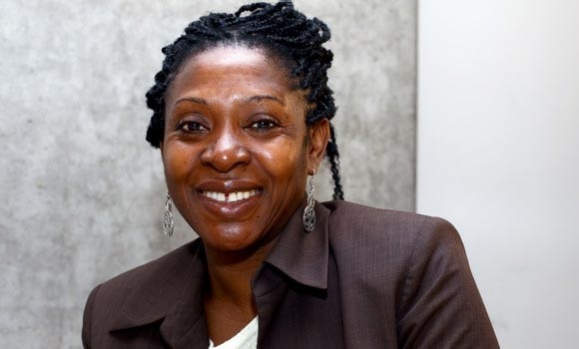Dr. Afua Cooper came to ¤Öêü°å¿üë½ with a mission: Make the James R. Johnston Chair in Black Canadian Studies a centre for excellence.
And by the sounds of it, sheãs halfway there.
Dr. Afua Cooper was officially announced as the new James R. Johnston Chair in Black Canadian Studies in the Department of Sociology and Social Anthropology. The announcement was made earlier this month at The Promise Landãs fourth annual public symposiumãs closing banquet and is Dalhousieãs third appointment to the chair.
One of a kind
ãIãm very excited about being the new James R. Johnston Chair in Black Canadian studies. Itãs really the only chair of its kind in Canada and provides an opportunity to really think about Black Canadian Studies, to conceptualize and re-conceptualize what it is and what it means.ã
Dr. Cooper received her BA in African Studies and Women's Studies from the University of Toronto in 1986 and her MA in Black Canadian History from the Ontario Institute for Studies in Education in 1991. She returned to University of Toronto for her PhD in Black Canadian History which she obtained in 2000.
The position will involve research, teaching and collaboration with the Black community, locally and nationally. One of Dr. Cooperãs priorities is to create a web portal that unifies Black Canadian studies for people to view online. Her goal is to create a web version of all digital formats of Black Canadian history and to create a dialogue for this area of inquiry.
ãPeople want to know, what is Black Canadian studies? What are we going to do with it? How are we going to bring such a branch of knowledge to the forefront?ã she asks. ãItãs been a branch thatãs been marginalized and subjugated, and as chair; itãs imperative I bring this to the fore.ã
Dr. Cooper says research will be a huge part of putting Black Canadian history on the map. Not only does she plan on merging Black Canadian studies in one central area via a website but to go beyond the archives and interview older generations of Black Canadians.
ãI want to look at the roots of Black Halifax by doing an urban study from inception to present time. I want to trace the history of Black people in Halifax from the very beginning,ã she explains. ãThis will be a study in sociology, urban anthropology and ethnography.ã
As part of this urban study, Dr. Cooper would like to pursue a study in the sociology of slavery in the Maritime Provinces.
Aside from the various research elements, the chair has a community component as well. Before its establishment, there was no organic link bridging the community and the academy. When the chair was founded and eventually established, it was a broad coalition of people that got together: academic, intellectuals, housewives, businessmenãpeople from all walks of life. The whole idea was for it to have an academic component and as well as a community component, she notes. Therefore, the chair must be open to suggestions from the various stakeholders in the Black community.ô
About James R. Johnston and the chair
The J.R.J Chair in a national, tenured, senior academic post covering all of Canada based at ¤Öêü°å¿üë½ honouring the distinctive historical presence of Black people in the community.
Dr. Esmeralda Thornhill, the first J.R.J Chair, was appointed to the Faculty of Law in 1996. The second chairholder was Professor David Divine who was appointed in January 2004 to the School of Social Work in the Faculty of Health Professions. This year, ¤Öêü°å¿üë½ is pleased to welcome Dr. Afua Cooper as the third appointed J.R.J Chair in Black Canadian Studies.
James Robinson Johnston, 1876-1915, was the first Nova Scotian of African descent to graduate from the Faculty of Law at ¤Öêü°å¿üë½. He became a renowned lawyer in N.S. and a leading humanitarian.

